In the ’50s planes didn’t fly across the pacific nonstop so soldiers were transported to Korea on troop ships, a trip of about 22 days. The ship to which I was assigned carried about 600 troops.
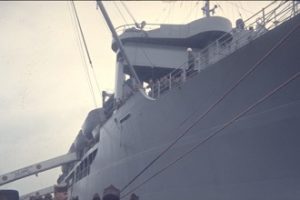
The troop ship USS Howze
We were each assigned a hammock in the hold of the ship. These hammocks were suspended by chains, stacked three or four on top of each other and grouped in pairs side by side. It was quite dark and stuffy down there. At the end of 22 days the place smelled like someone had opened up a skunk works.
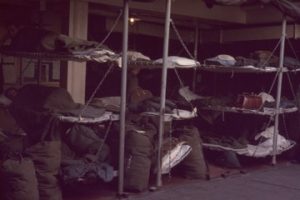
Hammocks aboard USS Howze
We sailed out into Puget Sound in the evening to a beautiful sunset and water as smooth as glass. That ship seemed so large that I didn’t believe it could be pitched about by the waves. This is going to be a breeze I thought, and crawled into my hammock and promptly went to sleep.
About 4AM I was awakened by creaking and shuddering along with a strange sensation of becoming very heavy, then very light. I was in a bottom hammock and as I looked out over the edge it appeared to be raining, and I heard sounds of retching and gagging. Turns out that the boys above me were getting sea sick. I immediately bailed out of there and headed for the deck and fresh air. There were many boys up on deck bending over the rail. I was OK until I went to the head (toilet) where several guys knelt in front of the johns with their heads in the holes. That did it for me, and I unwillingly joined them!
The mess hall was cafeteria style with a long chest-high stainless steel table with a raised edge and no chairs. Each person was expected to hook his thumb onto the table and his food tray, hang on for dear life with one hand and eat with the other. There were stainless steel pitchers of something resembling coffee on this table, and due to the pitching of the ship these went sliding past us at irregular intervals. Anyone wanting coffee would try to catch one as it flew by.
This scene was usually too much for me so I would slap some meat between two slices of bread, grab an apple, and head for the deck.
Going up a stairwell was a strange experience. Sometimes it was an all-out effort to climb up one step, then I would just float up the remainder with little or no effort.
I remember one incident when I was in a darkened room below decks watching a movie with some other troops. The strange thing was that it seemed to be a normal dark room, except there was the sensation of becoming alternately very heavy and very light. Suddenly the ship hit a rough spot and the projector fell over, causing the picture on the screen to rotate 90 degrees to the right. This caused the sensation that the ship was upsetting and over half the boys immediately fell off of their chairs.
After a few days most everyone obtained their sea-legs and felt OK. However there were a few poor souls that remained sick for the whole 22 days.
Inchon is a shallow water port and a large troop ship cannot get close to the shore, so we landed on the beach in small landing craft similar to the ones used in the invasion of Normandy. We disembarked from these and were loaded into the backs of duce-and-a-half trucks for our trip to the 7th division replacement depot (REPL-depot) in Camp Casey, a drive of about 2 hours.
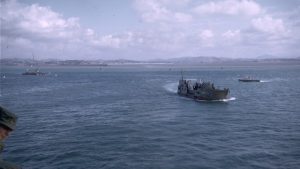
Landing craft in Inchon Harbor c:1955
What I saw during those next two hours ( and the next 16 months) came as a real shock – It was like being on a different planet. The poverty and hardships suffered by the Korean people were something that I had never experienced or even suspected. To see 5-year old kids starving, homeless and begging for food was not the normal thing I observed in Ohio.
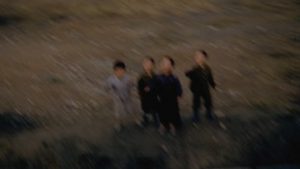
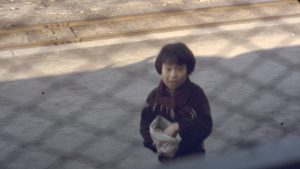
Children begging outside of Inchon
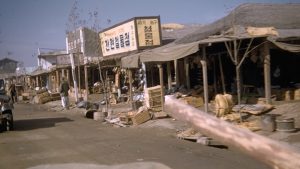
Korean village c:1955
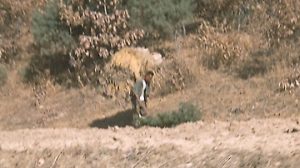
Korean farmer carrying load of straw
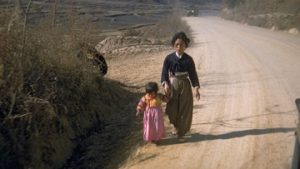
Mother & child (note pants made from GI blanket)
I thought I was pretty tough but nothing had prepared me for this. Many people had limbs missing. Shelters were made from whatever was available – cardboard boxes, old canvas, metal from old tin cans, etc. I saw one residence made entirely of beer cans. Later I saw people doing things to stay alive that they would not ordinarily do, including begging, stealing, and prostitution. The kids became extremely creative in their pick-pocketing abilities. We called them “slicky boys”. Because of press censorship this kind of thing was never talked about on the news at home or shown on TV.
When we arrived at the REPL-depot, we were each interviewed so we could be placed in a position the Army deemed useful. I heard that 7th Division Special Services was looking for musicians to travel around the Far East and entertain troops. I told the interviewers that I had played in a polka band and had done some things with a Hawaiian lap steel guitar, so they sent me and some other musicians to a special tent for an audition. The corporal in charge told me that they needed a steel player for a country band. I told him that I was his man – the problem was that there was no steel guitar on which I could audition, so the piano players and others were auditioned and I was left standing around in frustration. I picked up a bass and played along with some of the other tryouts. Then I picked up an accordion and played a polka, then picked up a guitar and sang a country song. I noticed the corporal was paying more attention to me than to the other candidates. He said that I didn’t mention to him that I could sing and play those instruments, so he was convinced that I could play a steel guitar even without a tryout, and if not I could be used on some other instrument. He then told me to go back to the REPL-depot and meanwhile they would cut some orders and send for me very soon. I was thrilled at the thought of playing music instead of agitating gravel!
The next thing I knew I was in the 49th Field Artillery right up on the DMZ – not exactly what I had expected. Some North Korean soldiers were visible in the distance, but a truce had been declared 2 years earlier and we were not shooting at each other. Probably the scariest thing we did up there was standing guard duty at night. Since we were not being shot at, other things we did were tolerable. Most of the time we were at the mercy of the elements. The weather was about like it is here in northern Ohio, except the rain and snow were more intense. The Army bull crap was not nearly as bad up there as it had been at Ft. Knox, and believe it or not, the food was much better.
Often we pulled back from the DMZ to practice fire missions with the 105 howitzers. This was actually fun since I didn’t have to dig holes for old Captain Baddass.
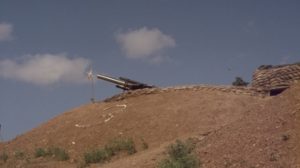
155 Howitzer in permanent mount aimed at North Korea C:1955
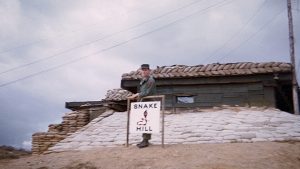
FDC bunker 49th field artillery
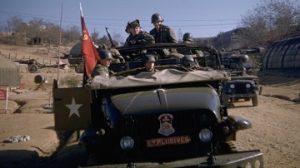
Going for a practice fire mission
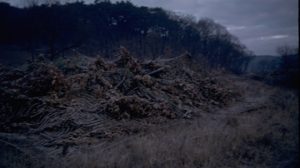
105 Howitzer under camouflage net on a frosty morning
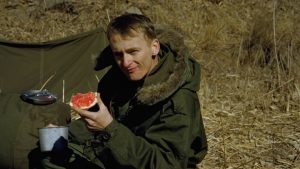
Glen takes a chow break during field maneuvers
Each week I would check with the sergeant in the orderly tent to see if there were any orders for me from Special Services. This went on for several weeks. I guess the sergeant became tired of my pestering and called Special Services. He told them there was a soldier here that says he was supposed to be in their country band. They replied that they had lost track of him, the Army couldn’t find him, and please send this guy back to 7th division headquarters.
When I heard this I almost started believing in God again!